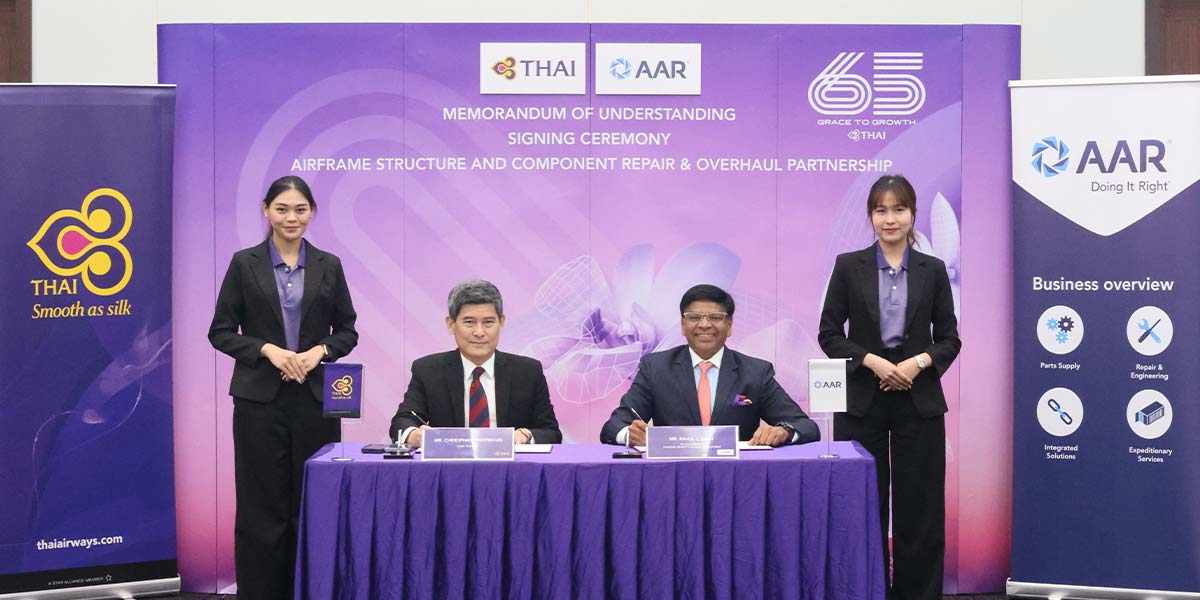Mr. Cherdphan Chotikun, Chief Technical Officer from Thai Airways International Public Company Limited (SET: THAI), stated that the company and AAR Component Services (Thailand) Limited (AAR) had signed an MOU, forming a business partnership framework for airframe related components (ARC) and equipment maintenance operation, as well as resource sharing process and to support airframe maintenance service.
The purpose of this partnership is to expand the two companies’ maintenance capabilities as they study the possibility of forming ARC facilities to repair THAI and other customers’ aircraft components.
AAR is supporting the component and engine maintenance operations by providing quality service with competitive prices. The company also promotes resource sharing to minimize the effect on airline operation as it works in THAI’s repair facility to fix various components, such as integrated drive generators, power drive units, heat exchangers, auxiliary power units, and line replacement units.
Furthermore, to support each companies’ maintenance operation, THAI and AAR allow each other to use its own repair facility, especially when business faces limitations. This agreement aligns with THAI’s technical strategy in expanding the capability of airports, equipment, components, and other products.
AAR is a world-leading maintenance service provider from the U.S. with specialized expertise. It is professionalized in maintenance, repair, and overhaul (MRO), ARC repair, component and supplies logistics, and enterprise fleet support services. Its ARC maintenance expertise is certified by various regulatory agencies, including the Federal Aviation Administration, European Union Aviation Safety Agency, and The Civil Aviation Authority of Thailand.
The two companies’ collaboration plays a significant role in advancing Thailand’s aviation industry standard as it allows the world leading expertise to pass on their knowledge in ARC maintenance through the partnership formation in the MRO industry, advancing ARC repairing infrastructure and ecosystem to become more coverage and sustainable.
Previously, Mr. Chai Eamsiri, Chief Executive Officer of THAI, stated that the company is preparing to attract entrepreneurs related to MRO business, such as ARC manufacturer and distributor and aircraft cleaners, to make joint ventures.
So far, the Eastern Economic Corridor Office of Thailand (EECO) has sent a letter to THAI, asking the company to deliver its proposal to the office by this September. It estimated that the construction will begin in 2027, with an investment of about THB 10 billion.
EECO also pointed out that the cooperation between THAI and Bangkok Airways PCL (SET: BA) is not a joint venture but an allocation of operational area. Each company will make its own investment, setting its own policy, and managing its own revenue, which should enhance the operation process agility.
This MRO project covers the land of about 210 rai, but BA will manage the area of 30 rai only. The rest will be operated by THAI due to its larger fleet scale. THAI’s purpose in this MRO project is to support its additional aircraft, which should expand its fleet to the size of 150 aircraft by 2033. Additionally, the company will also use some of the area t o create maintenance facilities for other customers.
As for the investment plan on U-Tapao’s MRO facility, THAI plans to construct six hangars within two phases. In the first phase, the company will construct three hangars along with related infrastructure within three years, using an investment of about THB 6 million.
In the second phase, the company will construct the remaining three hangars but use less funding since their infrastructures were already constructed in the first phase. This MRO facility will address wide-body aircraft and narrow-body aircraft and provide maintenance service, from line maintenance to overhaul maintenance.




